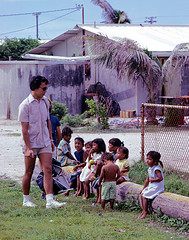
RMI Education and Skills Strengthening Project
The Government of the Republic of Marshall Islands has gotten funding from the World Bank for the Education and Skills Strengthening Project (ESSP) expense. It plans to use part of the earnings for seeking advice from services.

The consulting services ("the Services") will assist the Project Manager and the RMI National Training Council in carrying out the World Bank-funded job efficiently.
The task will concentrate on supporting the Project Implementation Unit (PIU) in developing a structure for Recognition of Prior Learning (RPL) for TVET, aimed at assisting the College of the Marshall Islands and the RMI National Training Council examine and enhance the abilities of workers through recognized college accreditation.
The detailed Terms of Reference (TOR) for the assignment are shown in the attached Terms of Reference (ToR).
The National Training Council now welcomes qualified people ("Consultants") to show their interest in supplying the Services. Interested Consultants ought to provide info demonstrating that they have the needed certifications and relevant experience to perform the Services (connect a Cover Letter of no greater than 4 (4) pages attending to the necessary experience and certification requirements curriculum vitae with a description of experience in similar assignments, comparable conditions, etc). Firms' personnel may express interest through the utilizing firm for the assignment. In such a scenario, just the experience and qualifications of people will be considered in the choice procedure. The criteria for electing the Consultant are: A.
Mandatory Qualifications and Experience Master's degree in education, training
, management, or an associated field. Minimum of 5-10 years of experience working in TVET System. Curriculum Design and Systems.
Possess 2-5 years' experience creating and
implementing RPL. frameworks, policies, and procedures. A sample of previous work will be required as proof of previous experience. Excellent interaction, training, and facilitation
abilities. Experience with working with varied stakeholders, consisting of government. companies, TVET institutions, companies, and students in the Pacific. B. Desired Qualifications and Experience Capability to deal sensitively in a multicultural
environment and develop reliable team relationships with customers and pertinent stakeholders. The attention of interested Consultants (consisting of firms )is drawn to paragraphs 3.14, 3.16 and 3.17 of the World Bank's"
Procurement Regulations for IPF Borrowers "July 2016 modified November 2020" Procurement Regulations ", stating the World Bank's policy on dispute of interest. Additional information can be obtained at the address listed below during office hours, 0900 to 1700 local time. Expressions of interest need to be
delivered in a written kind to the address listed below (personally or by email )by 5:00 pm, 23rd December 2024.
The subject line needs to state:"National Training Council Strategic Plan Consultant -full name of the candidate". Julius Lucky Director National Training Council!.?.!ntcdr@ntcinfo.org:Phone: 692 625-4521 Empowering Community Champions for Sustainable Development in RMI Gender Equality, Climate Resilience and Water Safety Training Majuro,
Republic of the Marshall Islands: The 4th
Women and Youth Training for
Gender Equality, Climate Change, Disaster Risk Reduction and Water Safety Management has actually just recently happened at the University of the South Pacific's campus in Majuro, the Republic of the Marshall Islands(rmi national training council ). This essential training was arranged by the United Nations Development Programme( UNDP )Pacific Office through the Addressing Climate Vulnerability in the Water Sector(ACWA) job. The week-long capacity-building training aimed to empower ladies and youth with the knowledge and practices needed for climate-resilient water safety management in the
Republic of the Marshall Islands(RMI ). This training enhances a commitment to enhancing rmi national training council's water security and neighborhood durability against climate change effects, particularly ladies
and youth, ensuring that nobody is left. The training welcomed individuals from all 24 atolls and included resource speakers from government companies, non-governmental organizations, and global development partners from the RMI Environmental Protection Authority, Climate Change Directorate, Office of the Chief Secretary, Ministry of Culture and Internal Affairs, National Disaster Management Office, Women United Together Marshall Islands, RMI Human Trafficking Task Force, Waan Aelõñ in Majel, Jo-Jikum, and the International Organization for Migration. In her opening remarks, Secretary for the Ministry of Culture and Internal Affairs, Brenda Alik, underscored the significance of cumulative action in constructing a climate-resilient nation."It is our obligation to come together and interact. As we deal with the difficulties positioned by environment modification, comprehending its effect on our water resources is important for enhancing the wellness of communities throughout the Marshall Islands,"she said.
RMI Environmental Protection Authority General Manager Moriana Philip highlighted in her speech the necessary function of ladies and youth in resolving climate-related challenges."This workshop joins us from numerous communities to address the pressing issues we deal with today, including climate-related challenges, especially on our water resources."We want to emphasize the crucial role of females and youth in this task as your participation contributes to its success and beyond, "she said.
The first day of the workshop covered important problems connected to gender equality, human rights, and public health within the Marshall Islands. It consisted of discussions on gender equality and mainstreaming, concentrating on the impacts of environment modification on water security and the disproportionate effects on susceptible groups. The significance of integrating gender equality and social inclusion into all project aspects was also discussed. Human rights and human trafficking were tackled, stressing the need for extensive defense of susceptible populations
throughout emergencies. Additionally, the workshop attended to gender-based violence, highlighting the numerous kinds that can occur in catastrophe situations, such as domestic violence and sexual coercion. The program concluded with a concentrate on sanitation and hygiene and their vital role in health, incomes, school attendance, dignity, and building resilient communities. ACWA Project Manager Koji Kumamaru expressed his gratitude to all participants
, stressing the value of their contributions to their communities."Women and youth are essential to the success of the ACWA task. More importantly, you are the champs and future leaders who will go back to your neighborhoods to empower others,"he said. Throughout the workshop, participants went to Rongrong Island and examined the 15,000-gallon Flatpack Modular water tank installed at the Rongrong High School Boys Dormitory as part of the ACWA task. The setup is a crucial element of the job, complemented by support from Australia
's Department of Foreign Affairs and Trade. The check out served as an important direct experience of the favorable effect of the ACWA task on the neighborhood and its
water resources. Marie Naisher from Jabat Island revealed her thankfulness for the chance to sign up with the workshop and explained her desire to be part of the project when it reaches Jabat.
"This was my very first time participating in such training, and I learned so much from the visitor speakers, group activities, and the site check out. I now comprehend the significance of tidy water and how to sanitize it. I'm fired up about the ACWA project concerning Jabat and ready to help when it shows up,"she said. Don Kobney, an ACWA site planner from Santo, Kwajalein, likewise shared his enjoyment."The workshop and website see improved my self-confidence and understanding of the water tank setup.
Seeing the 15,000-gallon flatpack modular water tank firsthand offered me a clear understanding of the system, and I'm looking forward to sharing this understanding with my neighborhood, "he stated. By the workshop's end, participants were better equipped to comprehend climate change and its regional impacts, drive adaptation and mitigation efforts, especially in water security, and use new resources to affect their neighborhoods positively. ACWA is enabled thanks to the support of the Green Climate
Fund, with the job co-financed by the Government of the Republic of the Marshall Islands
. The Marshall Islands: Skills Training and Vocational Education Project Examines the performance of the project and highlights lessons. Supplies inputs to two broader evaluations- the local assessment of ADB support for the Pacific and the unique evaluation study on Millennium Development Goals. The low educational attainment and lack of Marshallese skilled workers were mostly due to the poor quality of basic education, lack of access to education in the outer islands, and weak points in skills training and the vocational and technical education system.
These supported an economy marked by high joblessness because of constrained economic sector development and government downsizing. Joblessness was especially high among the youth and women in the external islands. Suitable local skilled personnel for existing job vacancies
were not available, hence the importation of properly knowledgeable foreign workers. Therefore, there was a mismatch in between available tasks and abilities of the Marshallese labour force. These conditions offered the effort for the Government
of the Marshall Islands to prioritize technical and vocational education training reforms. In 2000, ADB authorized a loan for $9.1 million to improve abilities training to offer well-trained workers needed for sustained financial and social advancement. This was to be attained through an integrated national abilities training system. The project included four elements: development of a career awareness program, skills training enhancement, boosted skills training opportunities for females and youth, and institutional conditioning. The expected outcome was increased income-generating opportunities and work for students, especially females and youth in the external islands. Overall, the task was rated unsuccessful. Limited progress was achieved in making the project responsive to the requirements of its recipients and private-sector companies. The long-standing weakness of bad numeracy and literacy proficiencies
amongst public primary and secondary school graduates and dropouts getting in college or participating in voc-tech education could be partially attributed to the poor quality of basic education. The project was supply-driven and might not develop a strong linkage with private sector requirements or align its activities with the requirements of the labour market. The status of the technical and vocational education training system has actually stayed basically the same after project conclusion. The research study advanced that ADB could motivate the Government of the Marshall Islands, through consultation and policy discussion, to follow through on the federal government's
commitment to developing a committed labour info system to link technical and trade education training program offerings with industry demand. Although the job established a labour market details system, in the absence of internal staff ability at the National Training Council, it was not fully operational.







